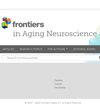Cognitive processing speed improvement after cochlear implantation
IF 4.1
2区 医学
Q2 GERIATRICS & GERONTOLOGY
引用次数: 0
Abstract
BackgroundUntreated hearing loss has an effect on cognition. It is hypothesized that the additional processing required to compensate for the sensory loss affects the cognitive resources available for other tasks and that this could be mitigated by a hearing device.MethodsThe impact on cognition of cochlear implants (CIs) was tested in 100 subjects, ≥60 years old, with bilateral moderately-severe to profound post linguistic deafness using hearing aids. Data was compared pre and 12 and 18 months after cochlear implantation for the speech spatial qualities questionnaire, Mini Mental State Examination (MMSE), Trail making test B (TMTB) and digit symbol coding (DSC) from the Wechsler Adult Intelligence Scale version IV and finally the timed up and go test (TUG). Subjects were divided into young old (60–64), middle old (65–75) and old old (75+) groups. Cognitive test scores and times were standardized according to available normative data.ResultsHearing significantly improved pre- to post-operatively across all age groups. There was no change post-implant in outcomes for TMTB, TUG or MMSE tests. Age-corrected values were within normal expectations for all age groups for the TUG and MMSE. However, DSC scores and TMTB times were worse than normal. There was a significant increase in DSC scores between baseline and 12-months for 60- to 64-year-olds (人工耳蜗植入后认知处理速度的提高
背景未经治疗的听力损失会影响认知能力。方法对 100 名年龄≥ 60 岁、使用助听器的双侧中重度至重度语言后耳聋患者进行了人工耳蜗植入对认知影响的测试。比较了人工耳蜗植入前、植入 12 个月和 18 个月后的言语空间素质问卷、迷你精神状态检查(MMSE)、韦氏成人智力量表第四版中的 "走小路测试 B"(TMTB)和 "数字符号编码"(DSC),以及最后的 "定时起立行走测试"(TUG)。受试者被分为青年组(60-64 岁)、中年组(65-75 岁)和老年组(75 岁以上)。结果所有年龄组的听力从术前到术后都有明显改善。植入后,TMTB、TUG 或 MMSE 测试结果没有变化。所有年龄组的 TUG 和 MMSE 年龄校正值均在正常预期范围内。但是,DSC 评分和 TMTB 时间比正常值差。在基线和 12 个月期间,60 至 64 岁年龄组的 DSC 分数有明显提高(t[153] = 2.608,p = 0.027),在 18 个月时仍有提高(t[153] = 2.663,p = 0.023)。年龄最大的参与者的认知分数最接近正常值,这表明只有最有能力的老年人才会选择植入人工耳蜗。在认知灵活性、注意力、工作记忆、处理速度和视觉感知功能方面,佩戴助听器或植入人工耳蜗的重度至极重度聋人仍然比同等年龄的正常听力者差。由于文献中缺乏针对听障人士的 TUG、TMTB 和 DSC 数据,本文报告的结果为今后的研究提供了一组重要的参考数据。
本文章由计算机程序翻译,如有差异,请以英文原文为准。
求助全文
约1分钟内获得全文
求助全文
来源期刊

Frontiers in Aging Neuroscience
GERIATRICS & GERONTOLOGY-NEUROSCIENCES
CiteScore
6.30
自引率
8.30%
发文量
1426
期刊介绍:
Frontiers in Aging Neuroscience is a leading journal in its field, publishing rigorously peer-reviewed research that advances our understanding of the mechanisms of Central Nervous System aging and age-related neural diseases. Specialty Chief Editor Thomas Wisniewski at the New York University School of Medicine is supported by an outstanding Editorial Board of international researchers. This multidisciplinary open-access journal is at the forefront of disseminating and communicating scientific knowledge and impactful discoveries to researchers, academics, clinicians and the public worldwide.
 求助内容:
求助内容: 应助结果提醒方式:
应助结果提醒方式:


